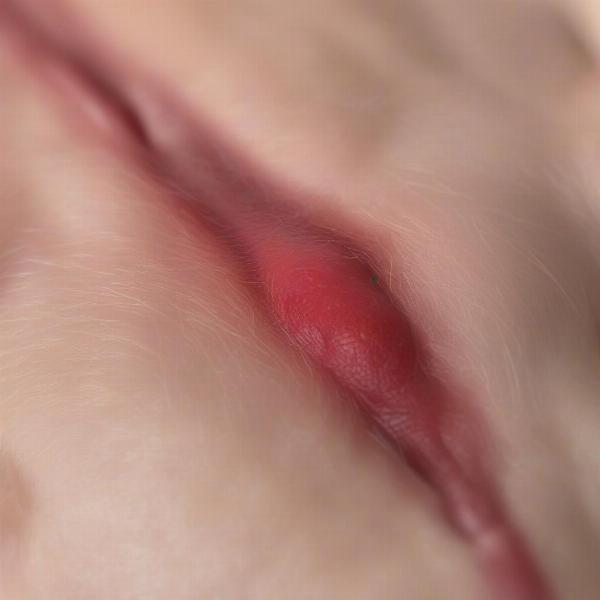The term “breast reduction dog ears” seems to be a misunderstanding or a misnomer. While dog ears are a common surgical term referring to excess skin at the closure site of an incision, often seen in procedures like tummy tucks or breast reductions in humans, it doesn’t apply to dogs undergoing any kind of surgery. If you’re concerned about your dog’s ears after a surgical procedure, it’s essential to consult with your veterinarian to understand what’s happening. This article will clarify the confusion surrounding “breast reduction dog ears” and address potential concerns about canine ear health post-surgery.
Understanding the Confusion: Dog Ear Incisions and Post-Surgical Care
It’s possible the term “breast reduction dog ears” arises from a misunderstanding of human surgical terms applied to dogs. In humans, “dog ears” are small, triangular skin flaps that can occur at the ends of incisions, particularly in breast reduction surgery. This has no correlation with any procedure performed on dogs, especially as breast reduction isn’t a common veterinary practice.
If your dog has recently undergone surgery, any concerns regarding their ears are likely related to the typical post-operative healing process. Swelling, redness, or slight discomfort around incision sites are common. However, these are general surgical after-effects and not specifically related to “dog ears.”
 Dog Incision After Surgery
Dog Incision After Surgery
Common Ear Issues in Dogs
While “breast reduction dog ears” isn’t a valid veterinary term, dogs can experience various ear-related problems. These include:
- Ear infections: These are among the most frequent issues, often caused by bacteria, yeast, or ear mites. Symptoms include itching, shaking of the head, and discharge.
- Ear hematomas: These are blood-filled swellings that occur between the skin and cartilage of the ear flap, usually caused by trauma or excessive head shaking.
- Aural Hematomas: A pool of blood that collects between the ear cartilage and skin, causing the ear to swell and droop.
- Allergies: These can manifest as ear inflammation and itching.
- Ear mites: These tiny parasites can cause intense itching and irritation.
Monitoring Your Dog’s Ears After Surgery
Any surgery can place stress on a dog’s system. While unrelated to “dog ears,” it’s important to monitor your dog’s overall health after surgery, including their ears. Observe for any unusual signs, such as:
- Excessive scratching or pawing at the ears.
- Head shaking or tilting.
- Redness, swelling, or discharge from the ears.
- Any signs of pain or discomfort when the ears are touched.
If you notice any of these symptoms, contact your veterinarian immediately. These signs could indicate an infection or other ear problem that requires prompt attention. Early diagnosis and treatment are crucial for preventing complications.
Conclusion: Addressing Ear Concerns in Dogs
“Breast reduction dog ears” isn’t a recognized veterinary concern. If you encountered this term and are worried about your dog’s ears, particularly after surgery, remember to consult your veterinarian for accurate information and diagnosis. Regularly checking your dog’s ears and seeking professional advice at the first sign of trouble are the best ways to ensure their ear health.
FAQ:
- What are “dog ears” in human surgery? They are excess skin flaps at incision closure sites, often seen in procedures like breast reductions.
- Do dogs get “dog ears” after surgery? No, this term isn’t applicable to canine surgery.
- What should I do if my dog’s ears look unusual after surgery? Contact your vet immediately for an examination.
- What are common ear problems in dogs? Ear infections, allergies, ear mites, and hematomas.
- How can I prevent ear problems in my dog? Regular ear cleaning, parasite prevention, and prompt veterinary attention for any concerns.
ILM Dog is a leading international online resource dedicated to providing expert advice and practical information on all aspects of dog care and well-being. From breed selection and puppy care to senior dog health and training, we offer a wealth of knowledge to help you navigate the joys and challenges of dog ownership. We cover everything from Dog Breeds and Selection, Health and Medical Care, and Training and Behaviour, to Nutrition and Feeding, Grooming and Hygiene, and Products and Accessories. For more insights and personalized guidance, contact our expert team at [email protected] or call us at +44 20-3965-8624. ILM Dog is committed to helping you provide the best possible care for your canine companion.